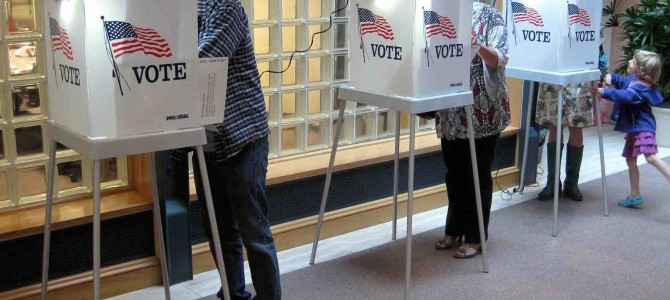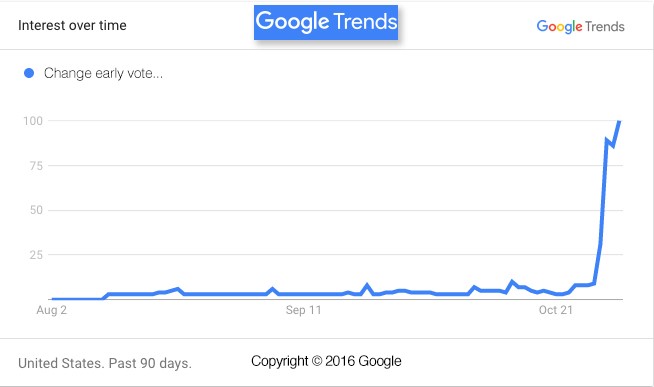
Thinking the presidency was finally within her grasp, Hillary Clinton was clicking the heels of her ruby-studded shoes and saying, “There’s no place like the White House. There’s no place like the White House,” but before she could say it again, a political IED went off nearby. FBI Director James Comey’s letter to Congress announcing he’d found more evidence in his bureau’s open investigation into Hillary’s conduct sent shockwaves throughout an already volatile race.
Deeply frustrated by Comey’s announcement, and finding her path to victory littered with damning WikiLeaks posts of hacked emails, Clinton’s stumbles have slashed her lead over Donald Trump and put states in play that were hers to lose.
In addition to her email imbroglio, Fox News is reporting that “‘The FBI’s investigation into the Clinton Foundation that has been going on for more than a year has now taken a ‘very high priority,’ separate sources with intimate knowledge of the probe tell Fox News.” The story continues, “FBI agents are ‘actively and aggressively pursuing this case,’ and will be going back and interviewing the same people again, some for the third time, sources said.”
With each new revelation, early voter reaction has been swift. Early voters headed to Google to search the term, “Change early vote.” That phrase became a legitimate trendsetter after Comey announced the reopening of the email investigation.

Yes, You Might Be Able to Change Your Vote
So far, various sources report that 22.5 million people have voted early, some using absentee ballots. As each devastating revelation has emerged, some of those voters are experiencing voter remorse. Some have even decided to change their votes.
Eight states technically allow this: Connecticut, Hawaii, Louisiana, Michigan, Minnesota, New York, Pennsylvania, and Wisconsin. Unfortunately, the deadlines in four of those have come and gone. The winnowed list now comprises Michigan, Minnesota, Pennsylvania, and Wisconsin. While Minnesota has been a perpetually dark blue state, Michigan, Pennsylvania, and Wisconsin have become contested and will continue to permit changes until Election Day.
But not everyone who voted early can make the swap. Only those who submitted an absentee ballot can change their votes. Those who voted early at their local town halls are out of luck.
A major scandal revealed in the closing days of a campaign can badly wound a presidential candidate. As each of the candidates continues along the perilous pathway to power, they are likely unaware of and unprepared for an adversary or an independent group, such as Wikileaks, to unveil a major scandal. The closer the revelation is to the election, the tougher it is to recover.
Replace Early Voting with a Voters’ Holiday
As a traditionalist, I see early voting as an existential threat to the electoral process, especially during what has become the most contentious, outré, and embarrassing presidential cycle anyone can remember. The country is deeply divided, and many pundits are increasingly muttering about what havoc will erupt at the hands of the loser’s supporters the day after the big event.
It’s a legitimate concern. Trump is the change candidate, and Hillary wants to keep the Obama foundation and build upon it as a status quo candidate. Trump supporters have had enough of what President Obama has built, while Clinton supporters are thirsty for more status quo. The divisions are sharp and angry. Early voting only makes this worse, unless people are allowed to change their votes.
Here’s how. Granted, there are a lot of voters, and early voting keeps the Election Day lines shorter, but if early ballots cannot be changed a wave of votes cast before their owners knew all the facts would hobble a new presidential administration. As releases of negligent or even criminal behavior continue, the accused candidate could still win but face an indictment between Election Day and Inauguration Day. But once the oath has been taken, a president cannot be impeached for illegal behavior that occurred before he or she entered the White House. So an indicted sitting president would trigger a constitutional crisis.
Such a president will be unable to advance his or her agenda if the opposing party controls either the House or Senate. The on-oing FBI investigations will continue, Congress will investigate the president’s foibles, and the new president will be hamstrung.
Instead, a presidential election day should be a federal holiday, on which those wishing to vote show up to vote, but not a minute before. During the 1950s and 1960s, businesses often gave employees the day off to go vote. It was a patently patriotic gesture. Everybody voted on the same day (except for those using an absentee ballot), so there was no confusion. Everybody will know right up until the big day what has been dug up about both candidates.
In this presidential cycle with late-breaking and important news about the candidates’ fit for the presidency, some fault could lie with states that allow people to vote early. That needs to change. If early voting is to continue, then all ballots, not just absentee ballots, should be changeable.








